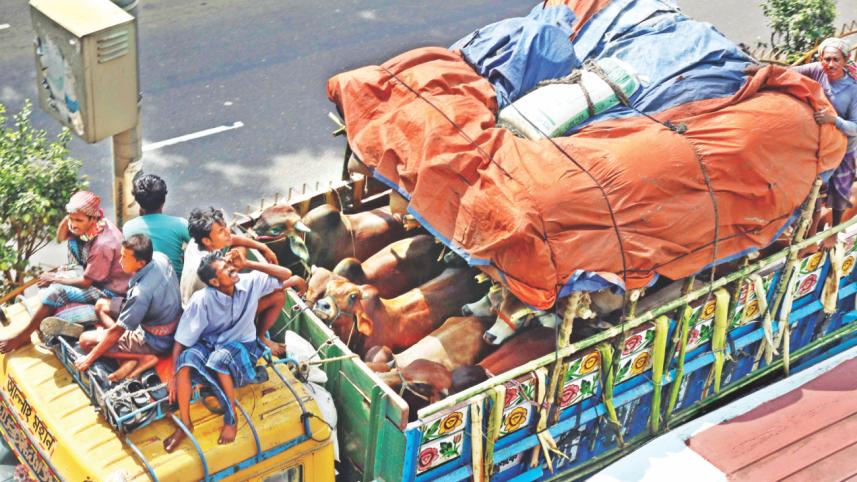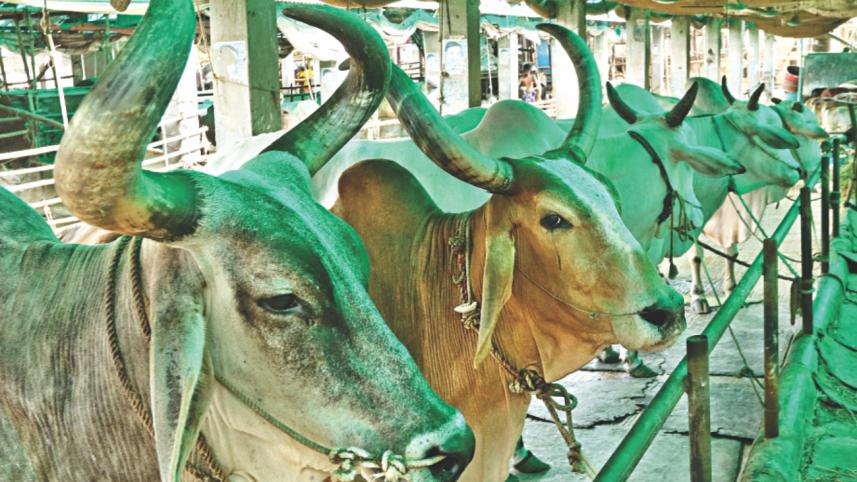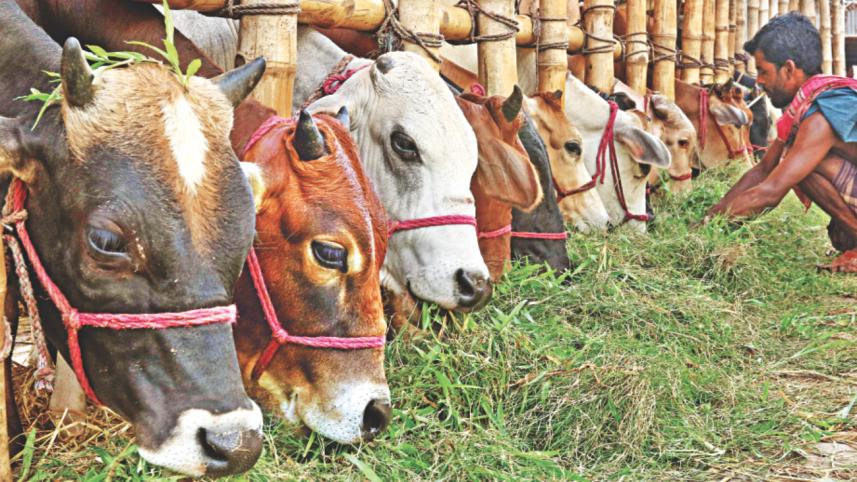Hope lies in local cattle

Prices of cattle have gone up in recent months after the BJP government in India choked the illegal supply channels to Bangladesh.
With the Eid-ul-Azha only a week away, traders are hopeful of making a good profit from sales of sacrificial animals this year.
Prices of cattle have gone up in recent months after the BJP government in India choked the illegal supply channels to Bangladesh.
Many traders said they could bring only a small number of cattle from India this week due to strict surveillance by the Indian Border Security Force.
Consumers will have to depend mainly on local cattle against the backdrop of the low supply from India.
Trader Emdadul Islam from Sharsha upazila in Jessore incurred losses of around Tk 80 lakh in the last two years on sale of about 550 bulls in the capital due to a huge supply of sacrificial animals.
Talking to The Daily Star yesterday in the city's Gabtoli Cattle Market, the trader's employee Shahidul said this year they have so far brought 20 bulls to the market and already sold three of them at between Tk 65,000 and Tk 1,05,000, which earned the trader Tk 26,000 in profit.
Shahidul expected that they would make a good profit this time around.
He said the supply of Indian cattle to Sharsha upazila has been minimal in recent months. However, local ranchers have almost doubled their production compared to last year's figures.

The demand for cattle may reach up to 40 lakh during the Eid, said sources at the Department of Livestock and Services (DLS).
At least one-third of the demand used to be met by cattle mostly from India and a little from Myanmar, according to data of the National Board of Revenue.
Trader Md Didarul Islam from Paikgacha upazila of Khulna said rearing of cattle by farmers in his area has almost doubled compared to last year's number as they look to profit from the business.
People from other professions also bought some bulls a few months ago to raise and sell them at good prices during the Eid season, he added. "I myself have raised three bulls this year, up from one last year."
Arafat Sunny, a cattle trader from Kushtia Sadar upazila, said around 20 farms in the upazila raised about 1,000 bulls each to sell them in the capital or in other major districts during the Eid season.
PRICES HIGHER
Traders said the prices of cattle are higher this year compared to last year as the purchase prices and transport costs have soared. The farmers also had to spend more on fodders.
A trucker charges traders Tk 20,000 to Tk 25,000 for transporting cattle from Kushtia to Dhaka, up from Tk 12,000 last year, said trader Shahidul Islam.
Golam Mostofa, a trader from Rajshahi, said he bought three bulls for Tk 47,000 each. Last year, bulls of the same size were sold at around Tk 37,000 each, he added.

Another trader Abdur Rashid said he brought 16 bulls from India through the Jatrapur border point in Kurigram on Tuesday. Around 2,000 bulls were brought from the neighboring country through the border point on the day.
"As the Indian Border Security Force kept a tight watch on the border, we had to spend Tk 10,000 more for each bull priced between Tk 30,000 and Tk 40,000," he said.
Trader Saidul Islam said he bought 23 bulls on Tuesday at a border point in Chapainawabganj. He had to spend Tk 10,000 more for each of them than their usual prices of Tk 25,000 to Tk 40,000.
Different breeds of bulls were on sale at Gabtali Cattle Market yesterday. They included bulls of Hariana of India, Butti of Bhutan and Nepali bulls.
A lot of buffaloes and goats were also put on sale at the city's lone permanent cattle market, but customers were thin.




 For all latest news, follow The Daily Star's Google News channel.
For all latest news, follow The Daily Star's Google News channel.
Comments